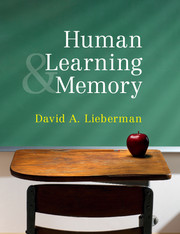Book contents
- Frontmatter
- Contents
- Figures
- Acknowledgments
- Introduction
- Part I Learning
- 1 Some basic assumptions
- 2 Classical conditioning
- 3 Conditioning principles and theories
- 4 Reinforcement
- 5 Reinforcement applications
- 6 Punishment
- 7 Theories of reinforcement
- Part II Memory
- Part III Learning and memory
- Glossary
- References
- Index
4 - Reinforcement
from Part I - Learning
- Frontmatter
- Contents
- Figures
- Acknowledgments
- Introduction
- Part I Learning
- 1 Some basic assumptions
- 2 Classical conditioning
- 3 Conditioning principles and theories
- 4 Reinforcement
- 5 Reinforcement applications
- 6 Punishment
- 7 Theories of reinforcement
- Part II Memory
- Part III Learning and memory
- Glossary
- References
- Index
Summary
One of the most obvious ways to encourage a behavior is to reward it. Parents praise children's good behavior; companies pay salespeople bonuses for high output; universities promote productive researchers. There is nothing new or profound about the idea of using rewards to encourage behavior – the principle was probably known and used long before the discovery of fire.
If the principle of reward is so obvious, though, why is behavior often so hard to change? Why do parents find it so difficult to get their teenage children to clean their rooms? Or, to take a more immediately relevant example, why do students sometimes find it so difficult to make themselves study? There are, after all, very powerful rewards for studying: in the short term, good course grades; in the longer term, a better job. Yet students often leave studying until the last minute, and some don't get around to it even then. Similarly, smoking and overeating can take years off our lives, and people are often desperate to give up these habits; yet the habits persist. Why is behavior in these situations apparently so irrational, when rewards as potent as a good job and longer life have little effect? Clearly, the principle of reward cannot be quite as simple as it sounds.
- Type
- Chapter
- Information
- Learning and Memory , pp. 140 - 183Publisher: Cambridge University PressPrint publication year: 2011



